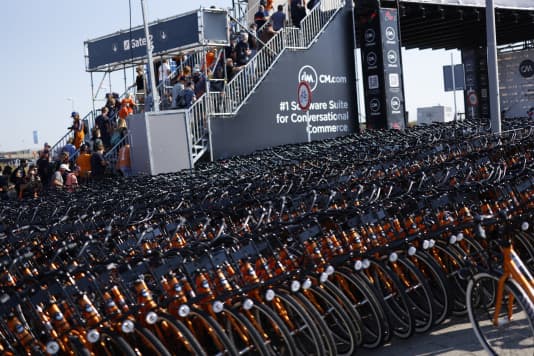Dutch Grand Prix Achieves 98% Sustainable Fan Travel, Sets New Standard for Major Events

Zandvoort, Netherlands – The Formula 1 Dutch Grand Prix has solidified its position as a global leader in sustainable event management, with an impressive 98% of its estimated 300,000 attendees arriving at the circuit this weekend via eco-friendly transportation methods. This remarkable achievement stems from a comprehensive strategy that banned private cars for general spectators, leveraging Zandvoort's unique geographical layout to foster innovative mobility and waste solutions.
Race organizers implemented a robust public transport network, significantly increasing train frequency to ensure a train arrived every 5-10 minutes. This was complemented by "Park & Bike" stations, allowing fans to park outside the venue and complete their journey through scenic dunes on rented bicycles. The success of this initiative is visible in the 40,000 bikes parked directly outside the track, transforming fan commute into a sustainable spectacle.
Beyond transportation, the Dutch Grand Prix introduced a gamified waste management system to dramatically reduce litter and boost recycling rates. Upon entry, fans receive a token exchanged for a plastic cup when purchasing a drink. Returning the cup for subsequent purchases or paying a €2 fee for a lost cup incentivizes responsible behavior.
"This system is commonly used at other events in the Netherlands, but it helped achieve a 75% recycling rate for cups during the race," stated Joe Pompliano, highlighting the effectiveness of the incentive-driven approach. The initiative effectively turns attendees into active participants in waste reduction, saving costs on cleanup crews and fostering a collective environmental consciousness.
The event's commitment extends to broader sustainability efforts, including a permanent green power grid and the use of HVO100 biofuel for generators and buses, significantly reducing carbon emissions. Waste is meticulously sorted and recycled post-collection, and materials like advertising banners are repurposed into items such as volunteer bags, ensuring minimal environmental footprint.
Dimitri Bonthuis, sustainability manager of the Dutch Grand Prix, emphasized the strategic importance of these initiatives, noting that the event aims to be a benchmark for Formula 1's goal of achieving net-zero carbon by 2030. The Dutch GP’s model, born partly out of necessity due to Zandvoort's constrained access, is now being studied by other major global events, including the Olympic Games in Paris.